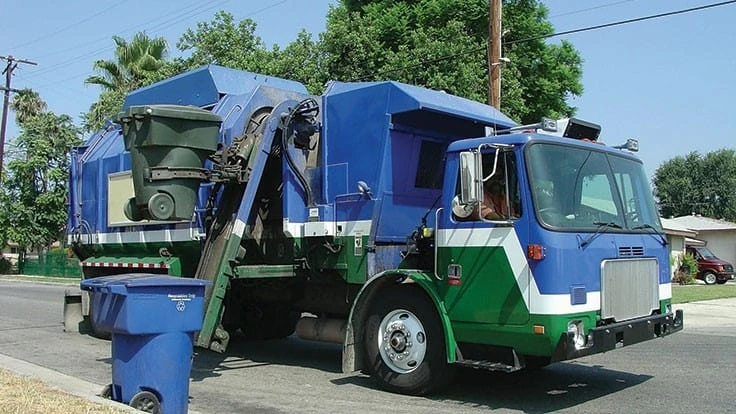
The U.S. Department of Labor’s Bureau of Labor Statistics (BLS) released the "2019 National Census of Fatal Occupational Injuries" report Dec. 16. The report shows that refuse and recyclable materials collectors had the sixth-deadliest occupation in the United States in 2019. This is a slight improvement, as refuse and recyclable materials collectors have been fifth on the list for the past several years.
According to the report, the workplace fatality rate for this group declined from 44.3 per 100,000 full-time-equivalent (FTE) workers in 2018 to 35.2 in 2019. This is still above the 2017 and 2016 rates, which were 35 and 34.1, respectively.
Solid waste collection saw a reduction in fatalities in 2019, with 43 worker deaths. This is down from 57 in 2018 but remains above the average rate of 36.6 over the previous eight years.
Fatalities at material recovery facilities (MRFs) remained unchanged from the previous year with three. The data profile for solid waste landfills does not show any fatalities listed for 2019; however, the Solid Waste Association of North America’s (SWANA’s) 2019 fatality report recorded 11 fatalities occurring at landfills, including several incidents involving landfill workers and contract employees. SWANA says it intends to reach out to BLS for additional clarification concerning its 2019 landfill employee category.
“Although the reduction in worker fatalities last year compared to 2018 is welcome, the frequency of these fatal incidents is still above historical averages and remains too high,” SWANA Executive Director and CEO David Biderman says. “We expect to report a further decline for the current year when SWANA releases its annual industry safety report for 2020 in connection with our February 2021 Safety Summit. SWANA will continue providing useful safety resources and information to the public and private sector waste industry in both the United States and Canada in our effort to reduce fatalities, accidents, collisions and claims involving our employees, trucks, heavy equipment and facilities. Nothing we do is more important.”
SWANA says the results of the 2019 worker fatality census and injury and illness data will be addressed at the virtual SWANA Safety Summit Feb. 25, 2021. SWANA’s 2020 fatality report also will be released as part of the Summit, followed by an analysis by industry safety experts into what this data means for collection and post-collection safety. Industry leaders will also gather to discuss their response to the pandemic along with lessons learned to prepare for future challenges.
The National Waste & Recycling Association also commented on the BLS data, applauding the overall reduction in fatalities but saying more work is needed to improve the rate of on-the-job incidences.
“The National Waste & Recycling Association and our members are committed to improving safety in our industry, and we will never accept any loss of life. We are pleased, however, that our industry has become safer,” NWRA President and CEO Darrell Smith says regarding the data. “Our staff works hard to ensure that our member companies have the tools and resources to operate safely.”
Over the past four years, NWRA and its chapters have lobbied for “Slow Down to Get Around” legislation, which is now the law in more than 30 states. These laws require that motorists slow down when waste and recycling collection vehicles are stopped and workers are getting on and off, just as motorists are required to slow down in construction work zones, stop for school buses or pull over for emergency vehicles.
In November, BLS released 2019 employer-reported injury and illness data showing an increase in the injury and illness rate for landfill workers. Employees doing collection and at MRFs saw decreases in their incident rates last year.
Latest from Recycling Today
- Orion ramping up Rocky Mountain Steel rail line
- Proposed bill would provide ‘regulatory clarity’ for chemical recycling
- Alberta Ag-Plastic pilot program continues, expands with renewed funding
- ReMA urges open intra-North American scrap trade
- Axium awarded by regional organization
- Update: China to introduce steel export quotas
- Thyssenkrupp idles capacity in Europe
- Phoenix Technologies closes Ohio rPET facility





